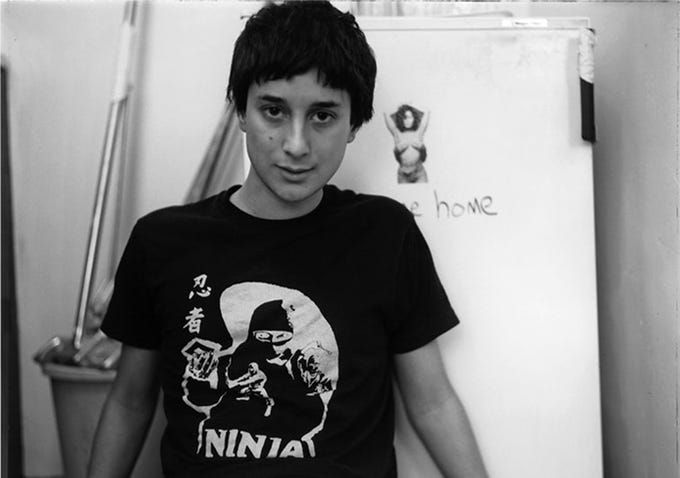Down the Rabbit Hole
Algorithmic virtues and addictive downsides. Untrusted media. Voting out moderation. How we learned to dislike Lex. Media is a party.
“If you gaze long into an abyss, the abyss will gaze back into you.”
Nietzsche
Below are this week’s timely topics, all discussed in fascinating detail on your fav People vs Algorithm’s podcast, our Friday AM. (Spotify | Apple Podcast)
Bonus: Anonymous Banker on transactional activity in influencer marketing.
More goodness than a big bowl of ice cream first thing in the morning.
Troy, Alex, Brian
1: Rabbit holes
TROY: I have been rabbit-holing old Carson interviews on YouTube. Like this one with Ronald Regan and its strong echoes of this moment. Jim Carrey, Robin WIlliams, Don Rickles and Frank Sinatra are all gold.
A thumbnail for a Harmony Korine collection of Late Show appearances persisted in my YouTube recco list. I took the bait. Harmony is a compelling guy, his Letterman appearance showed an endearing authenticity and an ability to see the absurdity of celebrity before others.
Then the algo kicked in. A Vice interview in Miami. This brief discussion on creative process. Harmony on his new project, itself a weird interactive world-building rabbit hole. I added the seminal film Kids from 1995 (written by a 19 year old Harmony) to my rewatch list. Let’s make it a Harmony film fest! Next up Gummo. Then Spring Breakers (A24’s second film).
Old media was linear. The Information Space is rabbit holes. Rabbit holes are my preferred way to experience media. Active until you want it to be passive. The algo can be an endlessly satisfying lodestar.
BRIAN: The counterpoint is rabbit holes are part of a wholesale war on our attention. I think in the coming years, social media addiction will become a public health problem. Going down some rabbit holes can be enjoyable and even worthwhile, but often people are guided there through algorithms that are designed to distract us and keep us engaged. It can easily become a form of addiction.
AI will likely make this worse. Meta’s pulling back on its plan to flood its “surfaces” with AI creators, but it will end up shoving this through. The personalization possibilities offered by AI will be used to keep people hooked. Doomscrolling will go into overdrive. The hope is that AI can also be used to combat distractions.
ALEX: my favorite way to get into rabbit holes is YouTube but its aggressive need to try and understand what I want to watch means my algorithm and home feed often gets overly affected by my last excursion into a topic. It’s a glimpse into how these tools work. An evening of diving into the history of Disneyland and YouTube thinks that is now all I care about. I sometimes miss the days of getting into rabbit holes on the old internet, where one link led you to another. It felt like sleuthing rather than just sharing an interest and some magical algo turning on a firehose. Other thing I don’t miss is Kids. That movie fucked me up.
2: Why do people trust creators and not the media?
TROY: The discussion paper, “The Future of Trustworthy Information: Learning from Online Content Creators” paints a useful picture of how a new kind of trust and intimacy is reshaping the audience relationship across the media spectrum.
In a subsequent Atlantic interview with Charlie Warzel, the study’s author, Julia Angwin offers insights into how traditional media can rebuild trust by adopting strategies from online content creators. Key takeaways include:
Embed trust markers: Incorporate elements of trust—such as transparency about expertise and intentions—directly into content, ensuring audiences can assess credibility without relying solely on brand reputation.
Real engagement: Foster real interactions with audiences by responding to feedback and demonstrating accountability, similar to how creators build loyal communities.
Transparency over objectivity: Shift from a stance of detached neutrality to one of transparent journalism, where biases and methodologies are openly shared, enhancing credibility.
From the report:
Despite the scarcity of formal journalism on those platforms, audiences increasingly are turning to content creators using short-form video formats on YouTube, TikTok and Instagram for information, according to the Reuters report.
Many of these creators serve roles that were traditionally filled by journalists. Consider Marques Brownlee, a YouTuber with 19 million subscribers whose reviews of tech products are hugely influential. The closest recent comparison to Brownlee is Walt Mossberg, the longtime tech product reviewer for The Wall Street Journal who was referred to in the industry as “The Kingmaker” for his influence. Mossberg retired in 2017.
Or consider Coffeezilla, a YouTuber with more than 3 million subscribers who investigates and reveals crypto scams and whose work is comparable to traditional investigative journalists. Or Anthony Padilla, whose YouTube channel with more than 7 million subscribers is perhaps comparable to Oprah with its in-depth interviews of famous people and deep dives into difficult topics.
The size of YouTube audiences often dwarfs traditional media. A mid-tier YouTube channel may have an audience of 4 million viewers — far more than all cable news combined on a single night. That’s not counting top YouTube channels with audiences in the tens and hundreds of millions, far eclipsing the reach of all top news media outlets combined.
Yet, mainstream journalism has not taken online content creators seriously, treating them largely as niche entertainers. There is plenty of silly stuff online — dance crazes and pranks — but there is also a lot of popular serious content such as instructional videos and explanatory journalism.
BRIAN: I haven’t seen a lot of evidence of publications making substantive changes to its product, not just to foster trust but increase relevance. Authority was not earned but bequeathed by a brand. Just because you got hired by some place doesn’t mean you’re automatically someone to trust. In analog, it was enough to have the brand halo. The reality is most of the people at big-name publications haven’t gone out on their own for a reason.
It was telling that the recent controversy over Honey’s business practices was started by an expose by Megalag, a New Zealand YouTuber.
The video has 16 million views. It wasn’t a Wall Street Journal or New York Times investigation. Coffeezilla also regularly exposes scams. He recently investigated Mr. Beast for his scammy business model.
And he dresses like a 1950s reporter with suspenders. There’s an arrogance in the capital J journalism industry that only journalists can do the important work of accountability. I don’t understand that. Journalism is not an accredited profession.
ALEX: The content is just more compelling and there is a lot of it coming hard and fast (for most). Creator content is also part reality show. The audience feels they get to know them and that parasocial relationship is going to be hard to build under the shadow of a brand.
3: Lex Fridman’s frustrating Zelensky interview
BRIAN: I assume Lex Fridman is an acquired taste. Of all the creators to emerge, Lex is the oddest to me since I don’t understand his appeal. The paranoid fringe likes to assume all kinds of things are psyops. Lex might actually be one. The monotone delivery, the pretentiousness of the dark suit, the constant invocations of love — all of it is off to me.
But he’s popular, and he went to Kyiv to have a conversation with Volodymr Zelensky. He made a big deal before the interview that he wanted to do it in Russian to get into the nuance that apparently wouldn’t be possible if Zelensky spoke English. He even began the interview with a long discourse on this and threw the translator under the bus since they did it Ukrainian, English and some Russian.
All that aside, the three-hour conversation was illuminating. It was hurt by Fridman’s naive questions. I’m sorry, this isn’t about finding love and all this weirdo nonsense. Zelensky called him out on this.
Fridman seems to believe he can help end this war, if only Zelensky comes to Joe Rogan’s comedy club. Sure, why not. We can have the first podcaster Nobel Prize winner.
It will become the norm for leading figures to be on these kinds of platforms. And it will put pressure on the creators to up their games. There’s value in both the traditional media interview and this kind of long-form conversation. This one felt like a missed opportunity.
TROY: I am over Lex though he summarizes interview discussion well and often has interesting guests. My suggestion, watch the short Lex clips on YouTube and return hours of time to your life. Rabbit hole elsewhere.
ALEX: I find him insufferable and he’s been carried by the guests he likely attracts because his interview style makes for an easy couple of hours where they too can feel like philosopher monks. It’s all incredibly vague and artificial. There’s little humility, curiosity, and intellect behind someone who constantly tries to tell us otherwise. Maybe he’s just managed to find a way to project the sycophancy onto the audience. Making them also feel good about themselves because, no matter how shitty your views are, at the end of the day it’s all about love and brotherhood.
4: Zuckerberg’s content-moderation capitulation
BRIAN: It’s time to cal it: Free speech has won over misinformation. Mark Zuckerberg is dismantling Meta’s expansive content moderation apparatus. His announcement of this makes clear he is casting his lot with the current vibe following the election, while trying to rewrite history that he was a victim. He was the guy who controls the board and instituted these policies. New haircut and chain, same slipperiness. Shamelessness remains the most durable moat.
Probably not a coincidence that this shift came immediately after Nick Clegg departed Meta and was replaced by Joel Kaplan, who has lots of Republican ties. Meta has also donated $1 million to the Trump inauguration. Zuckerberg has made the pilgrimage to Mar-a-Lago too. And he added UFC head and Trump pal Dana White to the Meta board. His image shapers have let known that deep down he was always libertarian curious. He also wore a $900,000 watch in the video. Let’s not forget this is the same person who had a business card that read “I’m the CEO, bitch.”
This could mark the close to a chapter that began after Trump’s election in 2016 through Covid where platforms were in the impossible position of policing content. Facebook hired 40,000 content moderators. Inevitably, it suppressed normal debate over hot-button issues like the origins of Covid and the validity of the Hunter Biden laptop. It also proved an impossible task to accomplish. There are just going to be too many false positives. I agree with Semafor’s Reed Albergotti that free societies need to accept some degree of “viral load flowing through the discourse.” ¯\_(ツ)_/¯
Give Elon Musk credit. Community Notes are imperfect, but perhaps the best, compromise. The alternative is the fact checking industrial complex. I give Zuckerberg credit for being practical in adopting others innovations, like when he ripped off Snapchat Stories with Instagram Reels.
It’s also noteworthy that Zuckerberg mentioned that Meta would need to align with the U.S. government to fight foreign government’s efforts to suppress speech. Ultimately, however, if tech companies want to do business in the EU, Brazil or anywhere else, they’ll need to abide by the laws of those places. It can’t hurt to have the leverage of the U.S. government on your side.
TROY: Seriously, kudos to Zuck, the most resilient of all modern business leaders. Let’s recap a few of his many quick pivots:
Evolves "The Facebook," a college directory, to Facecbook the social network. Crushes Myspace.
Augments static personal profiles with real time News Feed. Grabs way more attention spectrum. Hijacks media.
Facebook becomes an app platform with Facebook Developer API. Zuck backs off when it becomes a cesspool of attention and data sucking apps. Copies most important app functionality and makes native part of FB feature offering.
Shifts from banners to an owned, native, data-driven ad platform. Invests hard. Wins ad game at expense of publishers.
Quickly moves company from desktop to mobile first.
Sees threat of visual-first social media. Buys Instagram. Sees growing popularity of global messaging. Buys WhatsApp.
Prioritizes video. Copies TikTok with Reels.
Rebrands to Meta, invests billions, pivots to AR glasses.
Pivots metaverse investment to AI. Runs at market with open source LLAMA.
Post 2016 responds to acqusations that the News Feed fed misinformation that tilted election. Built huge moderation capability. Created liberal friendly veneer with Clegg.
Jettisons moderation in the name of free speach and bias. Finds new MAGA freindly front end.
The guy sees change and moves fast and shamelessly. It works great when you have the security of a money printing machine.
Will this change create an suffocating vortex of reality bending bullshit that eats Facebook and, eventually, all of us? Ryan Broderick thinks so, but he is generally pessimistic. I think people probably won’t even notice. Or Zuck will just fix it with the next pivot.
ALEX: I don’t think swapping from human moderation to community notes needed to include Dana White joining the board, or all the other pandering to the incoming admiration so the announcement was definitely about more than community notes
And when we congratulate Elon for this we should be reminded the feature preceded him. Also, hasn’t X been pretty ok with “censorship”? They suppressed the JD Vance dossier leak last year amongst other things.
It’s just a telling sign of how easy it is to manipulate the incoming administration. Everything announced seems like a cheap price to pay to have the government stay out of your way. The next administration won’t retaliate and Meta will outlive them all. Also, a potent reminder of Zuckerberg’s lack of shame when it comes to these things. He was ready to go into full pandering mode. Throw people he hired under the bus by calling them biased and their work “censorship”. It’s a game he’ll play for the next 4 years until the tides shift again. The market will love this.
5: Media’s party-promoter phase
Kyle Chayka wrote a good newsletter last month about the “new rules of media.” This part stood out to me:
“The most compelling publications or media brands are the ones that can throw the best parties, because it shows they can mobilize an IRL group of interesting people, who are then consumers and customers and clients. (See Feed Me, The Drift, Byline / The Drunken Canal cinematic universe.) Media brands increasingly work like fashion brands: Consumers have to want to wear them. If no one wants to come to your party, you’re doing it wrong.”
This is a reaction to the flimsy brands built during the scale era, where people pretended their growth-hacked ComScore numbers were synonymous with influence and therefore valuable. They weren’t. I’m always struck by conversations I have at the private dinners The Rebooting does how often events come up as a growth area. It points to content being a feature, not the product. This is a common feature of B2B that’s now coming to B2C.
TROY: Ya that was good. These are tough days for a media executive used to thinking about owned surface area, owned audiences, scale and structured ad products. I think Kyle refers to it as an “increasingly contextless internet,” which feels right. He also makes the point “The article is just the intellectual property made to be leveraged in as many spaces as possible.”
ANONYMOUS BANKER
Watch List: Influencer Marketing
Influencer marketing exists in a weird spot for many media minds. What’s indisputable is how much time people spend on social media (depending on age, it can be 50% of a person’s free time). The question is how much value can be wrangled from the social platforms to create companies of actual scale with real revenue and EBITDA. One area in the social ecosystem with positive traction and deals is influencer marketplaces (think LTK, ShopStyle, and Mavely). These marketplaces allow marketers to deploy large performance budgets at scale, so it’s less matching one brand to a massive influencer vs. Walmart reaching millions of users with the help of hundreds of smaller influencers. Performance ad offerings that offer an alternative to Google, Meta or Amazon can scale very quickly.
Last week, Mavely, one of the fastest-growing in the group, was acquired by Later (a Summit Partners portfolio company) for $250mm. The deal announcement was unexpected and, at a significant premium, a positive sign for this space. Strategics and private equity have had a keen interest in Mavely, but this past fall, as they approached the company and its banker, were rebuffed; everyone expected a process to start soon. The value paid by Later, a double-digit revenue multiple, was significant enough (50%+ premium compared to where many thought the business would trade) that Mavely’s parent company, Nu Skin, must have decided not to shop the asset.
The Mavely deal underscores two key trends. On a micro level, expect robust M&A activity in influencer marketing as platforms like Later+Mavely aim to expand their capabilities for both sides of the marketplace and explore additional monetization opportunities. On a macro level, specific segments in tech and media have seen buyers grow more aggressive - enough to tell potential targets, “Don’t hire bankers… we’re ready to pay the clearing price.” This approach has been unfolding this week at CES in the suites at the Cosmo and Aria, where relationships forged during the M&A lull - combined with renewed confidence in the broader economy - are motivating buyers to pay up rather than compete in a formal auction and risk losing out. And don’t pity the bankers; even in these direct deals, they’re still getting hired, earning similar fees with significantly less work.






